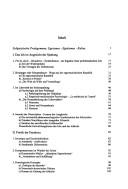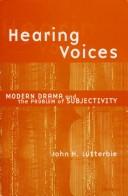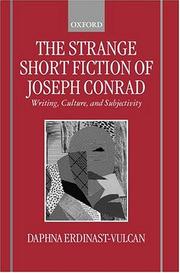| Listing 1 - 10 of 15 | << page >> |
Sort by
|

ISBN: 0198183739 Year: 1999 Publisher: Oxford New York Oxford University Press
Abstract | Keywords | Export | Availability | Bookmark
 Loading...
Loading...Choose an application
- Reference Manager
- EndNote
- RefWorks (Direct export to RefWorks)
Grief in literature. --- Modernism (Literature) --- Subjectivity in literature. --- Women and literature --- History --- Plath, Sylvia --- Deuil dans la littérature --- Mourning in literature --- Rouw in de literatuur --- Subjectiviteit in de literatuur --- Poetry --- Criticism and interpretation --- United States --- 20th century --- Femininity in literature

ISBN: 9042006307 9004455981 Year: 2000 Volume: 184
Abstract | Keywords | Export | Availability | Bookmark
 Loading...
Loading...Choose an application
- Reference Manager
- EndNote
- RefWorks (Direct export to RefWorks)
French literature --- anno 1600-1699 --- anno 1700-1799 --- anno 1800-1999 --- Ik in de literatuur --- Moi dans la littérature --- Self in literature --- Subjectiviteit in de literatuur --- Subjectivity in literature --- Subjectivité dans la littérature --- Soi dans la littérature --- Zelf in de literatuur --- Themes, motives

ISBN: 079142622X Year: 1995 Volume: *1 Publisher: Albany State University of New York
Abstract | Keywords | Export | Availability | Bookmark
 Loading...
Loading...Choose an application
- Reference Manager
- EndNote
- RefWorks (Direct export to RefWorks)
Subjectiviteit in de literatuur --- Subjectivity in literature --- Subjectivité dans la littérature --- American poetry --- Authorship --- Feminism and literature --- Feminist poetry, American --- Lesbians' writings, American --- Subjectivity in literature. --- Women and literature --- Women authors --- History and criticism --- Theory, etc. --- Sex differences. --- History. --- History and criticism. --- Lesbians' writings [American ] --- United States --- History --- Sex differences

Abstract | Keywords | Export | Availability | Bookmark
 Loading...
Loading...Choose an application
- Reference Manager
- EndNote
- RefWorks (Direct export to RefWorks)
Ik in de literatuur --- Moi dans la littérature --- Self in literature --- Subjectiviteit in de literatuur --- Subjectivity in literature --- Subjectivité dans la littérature --- French fiction --- -French fiction --- -Self in literature --- French literature --- History and criticism --- Self in literature. --- Subjectivity in literature. --- History and criticism. --- Soi dans la littérature --- Zelf in de literatuur --- 19th century --- 20th century
Book
ISBN: 9781438448350 9781438448343 Year: 2013 Publisher: Albany, NY SUNY Press
Abstract | Keywords | Export | Availability | Bookmark
 Loading...
Loading...Choose an application
- Reference Manager
- EndNote
- RefWorks (Direct export to RefWorks)
"Examines how six writers reconfigure African American subjectivity in ways that recall postmosternist theory"--Provided by publisher.
Subjectiviteit in de literatuur --- Subjectivity in literature --- Subjectivité dans la littérature --- 165.76 --- 820-32 --- 82.015.9 --- Postmodernisme. Poststructuralisme. Post-modernisme. Post-structuralisme --- Engelse literatuur: kort verhaal; novelle --- Literaire stromingen: postmodernisme --- 82.015.9 Literaire stromingen: postmodernisme --- 820-32 Engelse literatuur: kort verhaal; novelle --- 165.76 Postmodernisme. Poststructuralisme. Post-modernisme. Post-structuralisme --- African Americans --- American literature --- Postmodernism (Literature) --- English literature --- Agrarians (Group of writers) --- African American intellectuals --- Intellectual life --- African American authors&delete& --- History and criticism --- African American authors --- United States

ISBN: 0472108085 Year: 1997 Volume: *9 Publisher: Ann Arbor University of Michigan Press
Abstract | Keywords | Export | Availability | Bookmark
 Loading...
Loading...Choose an application
- Reference Manager
- EndNote
- RefWorks (Direct export to RefWorks)
Psychological study of literature --- Drama --- anno 1900-1999 --- Identiteit (Psychologie) in de literatuur --- Identiteit in de literatuur --- Identity (Psychology) in literature --- Identity in literature --- Identité (Psychologie) dans la littérature --- Identité dans la littérature --- Praatshows --- Radio talk shows --- Rôle selon le sexe dans la littérature --- Seksuele rolpatronen in de literatuur --- Sex role in literature --- Subjectiviteit in de literatuur --- Subjectivity in literature --- Subjectivité dans la littérature --- Talk shows --- Talk-show --- Television talk shows --- Identity (Psychology) in literature. --- Subjectivity in literature. --- History and criticism. --- Sex role in literature. --- 20th century --- History and criticism

ISBN: 0814707513 0814706142 0814706657 9780814707517 9780814706657 9780814706145 Year: 1994 Volume: 4 Publisher: New York, NY : New York University Press,
Abstract | Keywords | Export | Availability | Bookmark
 Loading...
Loading...Choose an application
- Reference Manager
- EndNote
- RefWorks (Direct export to RefWorks)
What is it that makes language powerful? This book uses the psychoanalytic concepts of narcissism and libidinal investment to explain how rhetoric compels us and how it can effect change. The works of Joseph Conrad, James Baldwin, Michael Foucault, Jacques Derrida, Arthur Miller, D.H. Lawrence, Ben Jonson, George Orwell, and others are the basis of this thoughtful exploration of the relationship between language and subject. Bringing together ideas from Freudian, post- Freudian, Lacanian, and post-structuralist schools, Alcorn investigates the power of the text that underlies the reader response approach to literature in a strikingly new way. He shows how the production of literary texts begins and ends with narcissistic self-love, and also shows how the reader's interest in these texts is directed by libidinal investment.Psychoanalysts, psychologists, and lovers of literature will enjoy Alcorn's diverse and far-reaching insights into classic and contemporary writers and thinkers.
Narcissism in literature. --- Narration (Rhetoric). --- Psychoanalysis and literature. --- Subjectivity in literature. --- Psychoanalysis and literature --- Narcissism in literature --- Subjectivity in literature --- Narration (Rhetoric) --- Languages & Literatures --- Literature - General --- Literature and psychoanalysis --- Literatuur en psychoanalyse --- Littérature et psychanalyse --- Narcisme in de literatuur --- Narcissisme en littérature --- Narration (Rhétorique) --- Narrative writing --- Psychanalyse et littérature --- Psychoanalyse en literatuur --- Subjectiviteit in de literatuur --- Subjectivité dans la littérature --- Verhaal (Retoriek) --- 82:159.9 --- Psychoanalytic literary criticism --- Literature --- Narrative (Rhetoric) --- Rhetoric --- Discourse analysis, Narrative --- Narratees (Rhetoric) --- Self-love in literature --- 82:159.9 Literatuur en psychologie. Literatuur en psychoanalyse --- Literatuur en psychologie. Literatuur en psychoanalyse --- This. --- book. --- change. --- compels. --- concepts. --- effect. --- explain. --- investment. --- libidinal. --- narcissism. --- psychoanalytic. --- rhetoric. --- uses.

ISBN: 0810116820 0810116839 Year: 1999 Volume: *2 Publisher: Evanston, Ill. Northwestern University Press
Abstract | Keywords | Export | Availability | Bookmark
 Loading...
Loading...Choose an application
- Reference Manager
- EndNote
- RefWorks (Direct export to RefWorks)
Beckett, Samuel --- 82.015.9 --- Literaire stromingen: postmodernisme --- Consciousness in literature. --- English prose literature --- Modernism (Literature) --- Self in literature. --- Subjectivity in literature. --- Irish authors --- History and criticism. --- 82.015.9 Literaire stromingen: postmodernisme --- Bewustzijn in de literatuur --- Conscience (Psychophysiologie et philosophie) dans la littérature --- Consciousness in literature --- Self in literature --- Soi dans la littérature --- Subjectiviteit in de literatuur --- Subjectivity in literature --- Subjectivité dans la littérature --- Zelf in de literatuur --- English literature --- Irish authors&delete& --- History and criticism --- Beckett, Samuel, --- Pei-kʻo-tʻe, Sa-miao-erh, --- Beḳeṭ, Samuel, --- Beckett, Sam, --- Беккет, Сэмюэль, --- בעקעט, סאמועל --- בקט, סמואל --- בקט, סמואל, --- بكت، ساموئل --- Prose. --- Prose --- Authors [Irish ] --- Ireland --- Beckett, Samuel, - 1906- - Prose. --- English prose literature - Irish authors - History and criticism. --- Bikit, Sāmūʼil,

ISBN: 0299141543 0299141500 Year: 1994 Volume: *13 Publisher: Wisconsin The University of Wisconsin Press
Abstract | Keywords | Export | Availability | Bookmark
 Loading...
Loading...Choose an application
- Reference Manager
- EndNote
- RefWorks (Direct export to RefWorks)
American literature --- Psychological study of literature --- Drama --- anno 1900-1999 --- Literature and psychoanalysis --- Literatuur en psychoanalyse --- Littérature et psychanalyse --- Psychanalyse et littérature --- Psychoanalyse en literatuur --- Psychoanalysis and literature --- Subjectiviteit in de literatuur --- Subjectivity in literature --- Subjectivité dans la littérature --- American drama --- Theater audiences --- Théâtre américain --- Théâtre --- History and criticism --- Psychology --- Histoire et critique --- Publics --- Psychologie --- Subjectivity in literature. --- History and criticism. --- Psychology. --- Theory, etc. --- 82:159.9 --- 820 <73> --- 820-2 "19" --- Literatuur en psychologie. Literatuur en psychoanalyse --- Amerikaanse literatuur --- Engelse literatuur: toneel; drama--20e eeuw. Periode 1900-1999 --- 820-2 "19" Engelse literatuur: toneel; drama--20e eeuw. Periode 1900-1999 --- 820 <73> Amerikaanse literatuur --- 82:159.9 Literatuur en psychologie. Literatuur en psychoanalyse --- Theory, etc --- Théâtre américain --- Psychanalyse et littérature --- Subjectivité dans la littérature --- Théâtre --- History and criticism&delete& --- 20th century --- Psychological aspects --- Théâtre (genre littéraire) américain --- Subjectivité --- 20e siècle --- Dans la littérature

ISBN: 0198184999 0191674427 Year: 1999 Publisher: New York Oxford Oxford University Press
Abstract | Keywords | Export | Availability | Bookmark
 Loading...
Loading...Choose an application
- Reference Manager
- EndNote
- RefWorks (Direct export to RefWorks)
This study engages with the troubled question of authorial subjectivity and ethics in Modernism in general and in Conrad's short fiction in particular, and offers an original theoretical perspective, inspired by the work of Derrida and the early philosophical writings of M. M. Bakhtin. Part One of the book focuses on the relational dynamics in 'Under Western Eyes' and 'The Secret Sharer', and develops a 'heterobiographical' reading matrix, which serves as a psycho-textual and philosophical approach to modes of authorial presence in the text. Part Two offers close readings of ten short stories spanning the whole of Conrad's career and clustered into five chapters--'Writing and Fratricide', 'The Pathos of Authenticity', 'The Poetics of Cultural Despair', 'The Romantic paradox', and 'Addressing the Woman'. This part of the book engages with the interpretative problems posed by these stories through a cultural-historical perspective, linking Conrad's essentially Romantic sensibility and his unique position on the threshold of Modernism with some of the issues that have emerged from the 'Postmodern turn': the relationship between metaphysics and subjectivity, the conception of inter-subjectivity as prior to and constitutive of subjectivity; the permeability of textual and psychological boundary-lines; and the desire for subjective aesthetization. These issues, which can all be traced back to the cultural crisis of the turn of the century, are still with us at the close of the millennium.
Ethics in literature --- Ethiek in de literatuur --- Ethique dans la littérature --- Kortverhaal --- Nouvelle --- Novelle --- Short story --- Subjectiviteit in de literatuur --- Subjectivity in literature --- Subjectivité dans la littérature --- Modernism (Literature) --- Short stories --- Story, Short --- Authorship --- Fiction --- History and criticism --- Conrad, Joseph, --- Korzeniowski, Józef Konrad Teodor, --- Korzeniowski, Joseph Conrad Theodore, --- Konrad, Dzhozef, --- Kʻang-la-te, --- Conrad-Korzeniowski, Joseph, --- Korzeniowski, Joseph Conrad-, --- Kʻonradŭ, Josep, --- Kʻonradŭ, Chosep, --- Kʻolladŭ, Josep, --- Konrad, Dzd. --- Conrad, Józef, --- קונראד, ג׳וזף, --- קונראד, ג׳וסף --- קונרד, ג׳וזף --- קונרד, ג׳וזף, --- קונרד, יוסף --- 康拉德, --- Konrad Nalecz Korzeniowsky, Jozef Tedor, --- Konrant, Tzozeph, --- Criticism and interpretation. --- Conrad, Joseph --- Criticism and interpretation --- England --- Conrad, Joseph, - 1857-1924 - Criticism and interpretation. --- Conrad, Joseph (1857-1924) --- Modernisme (littéraure) --- Morale --- Subjectivité --- Critique et interprétation --- Grande-Bretagne --- Dans la littérature
| Listing 1 - 10 of 15 | << page >> |
Sort by
|

 Search
Search Feedback
Feedback About
About Help
Help News
News